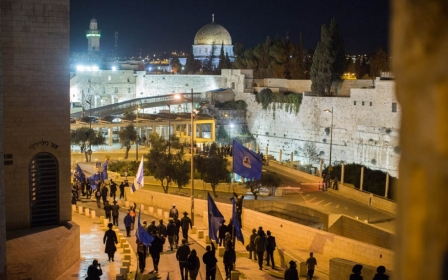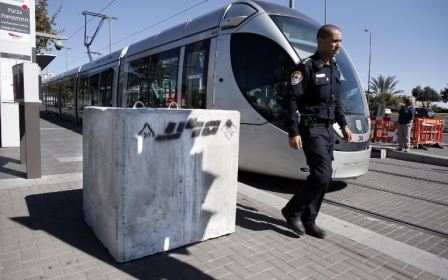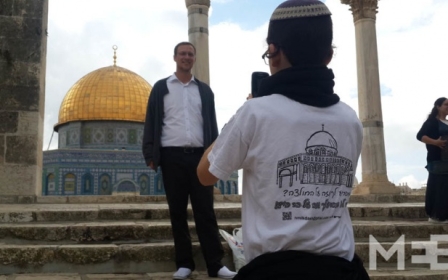Two Israelis killed in Palestinian stabbing attacks in West Bank

An Israeli soldier was killed after being stabbed by a Palestinian man today on the bridge outside the Haganah train station in south Tel Aviv. The Israeli army has refused to publicly disclose the soldier’s name, but the 20 year old is said to have died after being moved to the Sheba Medical Center in Tel Hashomer.
Zaki Heller, the spokesman for Magen David Adom, Israel’s medical emergency response service, described the soldier as having suffered from a number of stab wounds and said the soldier was unconscious and had no pulse when the medics arrived on the scene. He then died in the hospital after being resuscitated.
According to a Palestinian reporter from the local Ma’an News Agency, the Palestinian man who is believed to have carried out the stabbing is 18 year old Nur a-Din Abu Hashiya from the Askar refugee camp in the West Bank city of Nablus.
Abu Hashiya was not carrying a work permit, which may indicate that he had entered Israel illegally. Dropping his knife, he reportedly fled from the scene of the stabbing only getting about 200 meters or so, according to Tel Aviv police Commander Major General Benzie Sau, before being chased down by civilians and police officers. He was arrested after he entered an abandoned building on Lavenda Street.
"The incident is over and the suspect will be transferred to the Shin Bet security service for interrogation," Sau said.
Abu Hashiyeh, who sustained light injuries as police officers arrested him, is believed to have been spurred by nationalistic motivations and is said to have acted alone and not on behalf of any Palestinian faction.
Stabbing in the West Bank
A few hours after the stabbing in Tel Aviv, another separate attack took place near the Gush Etzion settlement bloc near the city of Hebron in the West Bank. A Palestinian man, Maher Hashlamon drove his car into the bus stop area near the Alon Shvut settlement, before getting out and wounding three Jewish settlers. A 25 year old Jewish woman was killed in the attack.
Hashlamon, a former prisoner of Israel, was shot by a security guard, and taken to Hadasseh Hospital in Jerusalem. It is not yet clear if he has succumbed to his wounds.
"A car stopped at the hitchhiking stop at the entrance to Alon Shvut, the driver got out of the car and stabbed three civilians who were standing there," Israeli police spokeswoman Luba Samri said.
Following the incident, clashes erupted in the Hebron after Israeli forces stormed into the home of the suspected stabber.
"A military force broke into the home of Maher al-Hashlamoun in central Hebron and searched his home," an eyewitness told Anadolu Agency.
Scores of Palestinian youths hurled stones at Israeli forces, which fired teargas and rubber bullets to disperse them, according to eyewitnesses.
One Palestinian was detained by Israeli forces and was taken to an undisclosed location, the witnesses said.
These are the latest episodes in a series of escalated attacks between Palestinians and Israelis. On Sunday, a 22 year old Palestinian was shot dead by Israeli police in the Galilee town of Kufr Kanna, after brandishing a small object at a police car. On 5 November, father of four Ibrahim Akkari ran over 13 Israelis in Jerusalem, killing one, before he was also shot dead by the police.
Tensions have been boiling in Jerusalem since the murder of 14 year old Palestinian Mohammad Abu Khdeir in the summer, but have recently intensified over Jewish right-wing groups’ repeated intrusions to the site of the Al Aqsa compound, which is considered to be the third holiest site in Islam and the holiest site in Judaism. Many Palestinians are prevented from being able to access Al Aqsa, as a result of a series of Israeli imposed restrictions, and they view the presence of Israelis there as deliberately provocative.
As incidents spill out from Jerusalem and the West Bank and into the streets of Israel, it remains to be seen whether the Israeli government can defuse the situation or if it will just be a matter of pointing fingers. Israel’s Economy Minister Naftali Bennet, for example, recently likened Palestinian Authority leader Mahmoud Abbas to a terrorist in a suit. At the same time, officials from the governing coalition party have made no secret of their views of Prime Minister Benjamin Netanyahu’s leadership, fuelling calls for an early election that are likely to take place within the next six months.
Netanyahu’s comments in a Likud meeting following the stabbings today reiterated his position that Israel will not be cowed by what he called terrorist attacks. “[We will]…use all the tools we have, including passing new laws destroying terrorists’ homes,” he said. “We won’t tolerate violence.”
Netanyahu went a step further and told Israel’s Palestinian population, who make up 20 percent of Israel, that they are welcome to move to the Palestinian Authority state or Gaza if they have a problem with the Israeli government and its policies.
Ahmad Tibi, a Palestinian member of the Knesset, told Reuters that Netanyahu’s comments were unprecedented.
“These kinds of things have never been said by any prime minister- not by (Menachem) Begin, nor by (Yitzhak Samir,” he said.
New MEE newsletter: Jerusalem Dispatch
Sign up to get the latest insights and analysis on Israel-Palestine, alongside Turkey Unpacked and other MEE newsletters
Middle East Eye delivers independent and unrivalled coverage and analysis of the Middle East, North Africa and beyond. To learn more about republishing this content and the associated fees, please fill out this form. More about MEE can be found here.




